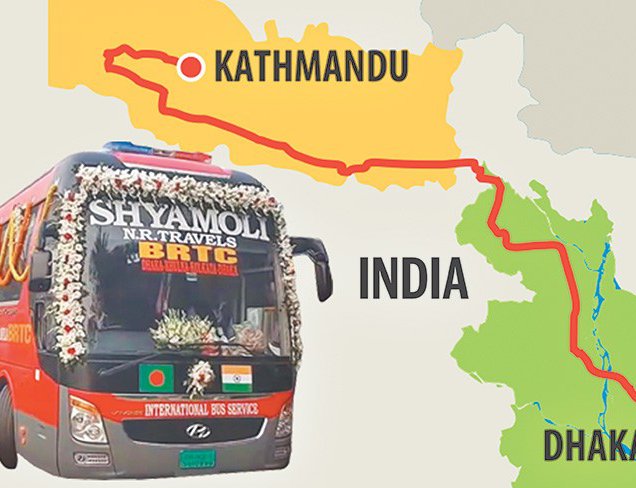
Two buses with delegates from Nepal, India and Bangladesh on board arrived Kathmandu on Thursday. The buses started on Tuesday, from Bangladesh capital Dhaka, as part of a trial run ahead of starting passenger and cargo services between the three countries.
The two buses covered the distance of 1,197 km--488 km in Bangladesh, 50 km in India, and 699 km in Nepal.
The trial run is an important step towards the Motor Vehicle Agreement (MVA) endorsed by Bangladesh, Bhutan, India and Nepal (BBIM). Bhutan pulled out in April 2017 after its government failed to ratify the agreement.
The parties signed the MVA agreement in June 2015. They had planned to start within a year.
The respective parliaments of Bangladesh, India and Nepal endorsed the agreement, but Bhutan did not. Bhutan has said its next government, after the 2018 elections, may take it up.
The MVA allows member states to operate their cargo and passenger services in each other’s territories without having to clear customs formalities at the border check posts.
The Ministry of Physical Infrastructure and Transport Senior Divisional Engineer Govinda Prasad Kharel said, based on the report of the buses journey from Dhaka to Kathmandu, the three parties would sign a protocol paving the way for commercial bus and cargo services.
New Delhi is likely to host the agreement signing. The transport secretaries of the three countries will sign the protocol.
“These services would help foster friendly ties, extend people-to-people exchanges, promote religious pilgrimage, tourism, business and investment prospects,” said Kharel, who travelled in the bus from Dhaka to Kathmandu.
According to The Kathmandu Post, the two buses had six officials from Nepal, 12 from India and 25 from Bangladesh. One of the officials from Asian Development Bank (ADB), facilitators of the agreement, and seven staff members of a Bangladeshi travel company including bus staff travelled to Kathmandu.
Officials from three countries noted their observations during the long journey. There are no road condition issues in Bangladesh and India. In Nepal, the Muglin-Narayanghat road section is under construction and the road from Muglin-Kathmandu is narrow.
“Officials from India and Bangladesh expressed satisfaction over the road widening. This further boosts prospects of vehicular movement between the three nations soon,” Kharel said.
Under the MVA, the three countries will sign bilateral and trilateral agreements to enable seamless connectivity for passenger and cargo movements. The member states have identified 30 transport connectivity projects, estimated at over $8 billion, to upgrade the remaining sections of trade and transport corridors.
The concept of BBIM started after Pakistan rejected the SAARC Motor Vehicle Agreement. Later, Bhutan, Bangladesh, India and Nepal signed a sub-regional agreement.
The BBIN gathered momentum after the 18th SAARC summit held in Kathmandu in 2014.
- Three-Day Global Science-Policy Forum: Socially Inclusive Solar Irrigation Systems Concluded
- Apr 26, 2024
- Nepal And China Ink Two Agreements , PM Prachanda Meets Chinese Delegation
- Apr 26, 2024
- Nepal Army Held National Cyber Security Symposium
- Apr 26, 2024
- Nepal’s Investment Landscape Revitalize By Nine Ordinances: FNCCI President Dhakal
- Apr 26, 2024
- Weather Forecast: Partly Cloudy In Hilly region And Mainly Fair In Plain Areas
- Apr 26, 2024
















